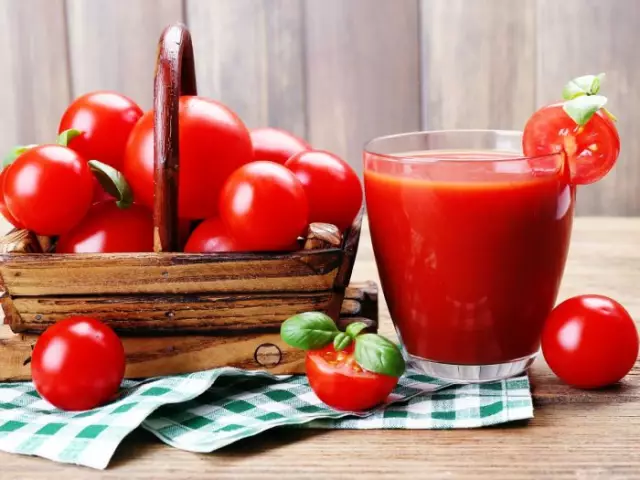- Author Rachel Wainwright wainwright@abchealthonline.com.
- Public 2023-12-15 07:39.
- Last modified 2025-11-02 20:14.
Tomato juice

Tomato juice is one of the most valuable and healthy juices. This refreshing and strengthening drink is made from tomatoes. In the wild, the tomato is a perennial plant. It is bred as an annual vegetable crop. The homeland of tomatoes is considered to be the tropical part of South America. In the United States, tomatoes have long been cultivated as an ornamental plant because they were considered poisonous.
Currently, about 700 varieties of ordinary tomato have been bred. The most popular of them are smooth-skinned spherical, pear-shaped and oblong fruits.
The composition and benefits of tomato juice
This natural drink is as healthy as the tomatoes, which are its base. It is rich in many useful inorganic and organic substances. The huge benefit of tomato juice is that it contains glucose, fructose, organic acids - citric, oxalic, malic and tartaric. This juice contains vitamin A, B vitamins, vitamins H, PP, E, vitamin C.
The benefits of tomato juice are indicated by the presence of proteins, fats, carbohydrates in tomatoes. It contains a lot of salts of phosphorus, manganese, potassium, magnesium, chromium, cobalt, zinc and iron. The calorie content of tomato juice is very low. The calorie content of tomato juice is 21 kcal per hundred grams of drink.
The bright red color of tomatoes is due to the presence of lycopene in them. This is a special pigment that is a powerful antioxidant that prevents the development of cancer. Lycopene is very important for the prevention of cancer of the rectum, breast, prostate in men, cervix, esophagus. This healthy tomato juice helps fight blood clots. It stimulates the body's production of serotonin - the "hormone of joy". The components of this natural drink prevent the processes of putrefaction in the intestines and improve its functioning in general. That is why tomato juice is very useful for constipation.
Tomato juice also has a diuretic, choleretic, antimicrobial and anti-inflammatory effect. Its regular use helps to strengthen the capillaries and prevent vascular atherosclerosis. In diabetes mellitus, juice is prescribed as part of the diet, since it has a hypoglycemic effect.
A drink is used for hypertension, anemia, angina pectoris, after a heart attack. The juice is also useful for some forms of kidney stones, glaucoma and impaired memory.
Tomato juice for weight loss

The low calorie content of tomato juice and the ability to influence metabolism allows it to be used in therapeutic dietary nutrition.
For weight loss, tomato juice should be consumed between meals (a glass of drink without salt half an hour before meals between meals). Such a diet, while reducing fatty foods to a minimum and excluding sweets and fried foods, allows you to reduce weight by 4-5 kilograms in two weeks.
The harm of tomato juice
Tomato juice is undoubtedly very healthy. Tomato juice can harm the body if it is used incorrectly. It is not recommended to mix juice or tomatoes with bread, potatoes, eggs, cottage cheese and fish. This can trigger the formation of kidney stones. You should also not subject this drink to heat treatment, since acids useful for the body are converted into inorganic. The most useful is the juice made from fresh tomatoes at home. It is recommended to drink it half an hour before meals, and eat tomatoes with any vegetable oil, cheese, herbs, garlic, onions, bell peppers, cabbage, radishes, eggplant and zucchini.
With undeniable usefulness, this product has limitations in use. The benefits and harms of tomato juice depend on the state of human health. It is contraindicated in case of allergy to red vegetables and fruits, with gallstone disease. The acids in this drink can cause stones to move.
Do not drink juice for stomach ulcers and pancreatitis, as well as for food poisoning.
You should also refrain from eating unripe fruits, since they contain the poisonous glycoside solanine.
Found a mistake in the text? Select it and press Ctrl + Enter.






